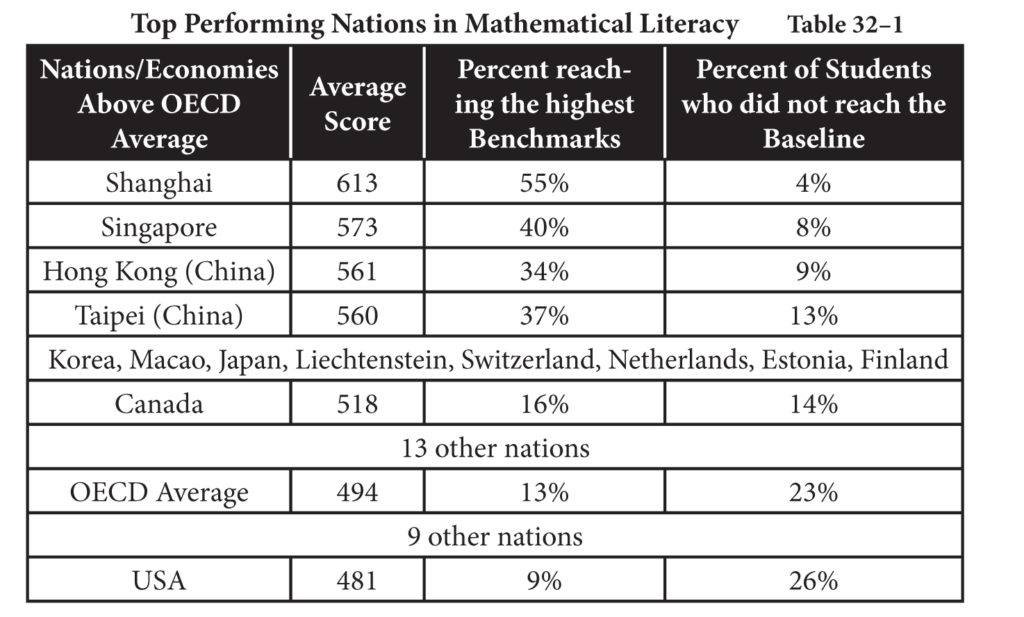This question has recently appeared on Quora in various forms, as Americans see a gradual decline of the US on the world stage. American economic and military dominance originally emerging from its strength in the STEM subjects (Science, Technology, Engineering, and Mathematics) is now seen to be in serious decline as the Asian countries embrace these subjects with a passion. China, a third world country three decades ago is now the world’s second largest economy and moving aggressively to reach the top spot. During those decades, the decay in mathematical and scientific competence has been evident through international studies such as PISA (Programme for International Student Assessment) and TIMSS (Trends in International Mathematics and Science Study) Table 32–1 taken from Intelligence: Where we Were, Where we Are, & Where we’re Going, shows the ranking of other nations relative to the US in mathematical literacy.

Table 32–1 shows that US ranked close to 40th in mathematical literacy and only 13% of its students, compared to 55% of the students in Shanghai reached the highest levels of competence.
If we assume that the cognitive abilities of the East Asians and Americans are (on average) not substantially different, the TIMSS and PISA studies suggest that the difference in the performance of these students derives from the home and/or school learning environments. An OECD report explaining the top performance of China in the PISA study begins with the statement, “China has a long tradition of valuing education highly.” Indeed, the Chinese (and other East Asian countries) place a high premium on mathematical competence. The parents in these Asian countries hold their children accountable for learning mathematics, while many American parents delegate this responsibility to the schools where mediocre performance can earn praise. The OECD report states:
Fifteen-year-olds in the United States usually rate themselves comparatively highly in academic performance in PISA, even if they did not do well comparatively. This may be partly due to culture, but one interpretation is also that students are being commended for work that would not be acceptable in high-performing education systems.
In China, children who perform poorly in mathematics are scolded for not working hard enough, while a poorly performing American student is deemed to be lacking in mathematical ability. American psychologist Steven Pinker emphasizes the importance of acknowledging that mathematical competence is accessible to virtually everyone, but it must be earned:
Mastery of mathematics is deeply satisfying, but it is a reward for hard work that is not itself always pleasurable. Without the esteem for hard-won mathematical skills that is common in other cultures, the mastery is unlikely to blossom.
China abandoned the keju (study of Confucian philosophy and Chinese literature) in 1905 when it recognized that ignoring the STEM subjects had delayed its entry into the Industrial Revolution, and had ultimately led to its collapse as the dominant world power. However, the Chinese learned their lesson well, and today they place great emphasis on these subjects, attributing status to those who excel. Meanwhile, in America, those who succeed in these subjects are often dismissed by the derogatory term “nerd.” Many of those who do respect the intellectual power of “nerds”, often perceive them as unidimensional people with an interest in arcane things that most “normal”, well-balanced, people don’t care about. This widely-shared view of the nerd, is caricatured in the very successful television series The Big Bang Theory that premiered in September, 2007 and aired its final episode on May 16, 2019. At a time when the other First World nations are placing a high premium on intellectual endeavor, a large portion of the American public seems to be retreating into the “bread and circuses” world of spectator sports and entertainment. The greatest challenge to American supremacy and the American way of life is coming from its affluence. As Oliver Goldsmith observed 250 years ago, “Wealth accumulates and men decay.”
